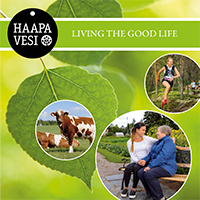Education

Early education (varhaiskasvatus)
Early education is arranged in municipal and private day care centres and family day care. Early education can be full or part time. A customer fee based on income is charged for early education.
The application form (Hakemus varhaiskasvatukseen) for municipal early childhood education can be filled out here.
Preschool education (esikoulu)
According to the Finnish law, children must attend preschool education or other similar activities for one year before compulsory education begins. Preschool education (esiopetus) prepares children for comprehensive school. Children normally enter preschool education at the age of six and comprehensive school at the age of seven.
Parents normally enrol their children in preschool education in January or February. Check the time well in advance with your local school services (koulutoimi) or education services (sivistystoimi).
Preschool education is free-of-charge. During the day, the child will receive a free meal. If the child lives far away (over 5 km) or the route is difficult, he or she will receive free transport.
In addition to preschool education, the child can also attend early education if the parents are working or studying.
Preschool days last about four hours. Children often attend preschool on the premises of a day care centre or school.
In preschool, children learn mathematics, environmental and natural awareness as well as art and culture. They pick up new things through play.
Parents have an important role in preschool education. They support their child’s learning. The teachers prepare an individual curriculum for each child. Parents can assist the instructors in the preparation of the plan.
Children whose native language is something other than Finnish or Swedish will study Finnish or Swedish as a foreign language.
Comprehensive education (peruskoulu)
In Finland, all children go to school, because according to the law, all children must receive comprehensive education. Teachers are highly educated and the teaching is of high quality in all schools.
In general, children and young people receive comprehensive education in comprehensive school. A child usually starts school in the year when he/she turns 7. Comprehensive school usually lasts nine years. Comprehensive school is free for everyone.
Children must be enrolled into school by their parents. The municipality sends a compulsory education notice (oppivelvollisuusilmoitus) to appropriate homes at the beginning of each year. The notice lists each child’s local school (lähikoulu). The local school is usually the school that is closest to home. Parents can also choose to send their child to a school other than the local school. However, it is not always possible to get your child a place in any other than the local school.
There are 6 comprehensive schools in Haapavesi (five primary schools from grades 1 to 6 and an upper comprehensive school from grade 7 to 9).
The biggest primary schools (Hyttikallio and Mäkirinne) are situated near the center of the city. Vattukylä, Humaloja and Mieluskylä schools are situated within 10 km from the city.
School begins in August and ends in late May or early June. School is out for the summer during June and July.
The length of school days varies between grades. In primary school, the days are shorter than in secondary school. Individual classes usually take 45 minutes. A school week usually comprises approximately 20 classes.
Children have a single hot meal in school. It is free-of-charge. If your child has a special diet, please inform a teacher.
In comprehensive school, children study many compulsory subjects. In the final grades of primary school and in secondary school, they can also choose optional subjects.
In school, all children can receive education in their own religion or in ethics. Education in a particular religion must be arranged when a municipality contains at least three children of that religion.
The school uses the Wilma online service to communicate about important matters. The school gives the child’s parents a username and password for the service. Through Wilma, you can stay in touch with your child’s teachers and receive information about your child’s learning, exams and absences as well as school events and holidays. If your child must be absent from school, for example due to illness, inform the school through Wilma that morning. It is important to monitor Wilma regularly. If you need help with using Wilma, ask the school for guidance.
In Finland, schools organise joint parents’ evenings for the parents of pupils. They are meant for all parents. At parents’ evenings, you will get to know your child’s school, teacher and other parents. You will also obtain information about your child’s schooling and what takes place at school. When you are familiar with your child’s studies and school matters, you will be able to help and support your child better.
Upper secondary school (lukio)
In Finland, you can apply to upper secondary school after you have completed comprehensive school. Upper secondary school provides all-round education aiming at the matriculation examination. Upper secondary school prepares you for a university of applied sciences or a university. Apply for upper secondary school via the upper secondary level joint application process (yhteishaku).
Upper secondary school studies usually last three years. Upper secondary school can also be completed in two or four years.
Upper secondary schools provide plenty to choose from in terms of studies. In addition to obligatory courses, you can select a variety of courses that suit your preferences. In upper secondary school, you can affect the content and progression of your studies. Upper secondary schools do not have tuition fees. In other words, education is free. Those students that star upper secondary school in autumn 2021 or later will get their schoolbooks for free.
Upper secondary school studies are aimed at the matriculation examination (ylioppilastutkinto). The matriculation examination comprises exams on various different subjects. The matriculation exams (ylioppilaskoe) are usually taken near the end of the studies.
The national language test is obligatory in the matriculation examination. You can take the test in Finnish, Swedish or Sami. If your native language is not Finnish, Swedish or Sami, you can take the test for Finnish or Swedish as a second language.
In addition to the national language test, you must complete tests in at least three other subjects. If you want, you can also take more tests.
Haapavesi upper secondary school pays special attention to initiative approach to work, new technologies and promotes development of bold ideas.It offers a diverse curriculum and high level of teaching.
Vocational education and training (ammatillinen koulutus)
Vocational education and training are very practically-oriented and provide the student with the necessary skills for working life. The education and training are intended for young people completing their basic education and for adults who are already working. Vocational education usually takes three years. After vocational education and training, you can start working or apply to a higher education institute.
You can apply for vocational education and training in Finland after you have completed the comprehensive school syllabus or have acquired the corresponding skills in other ways. The education provider assesses whether the applicant’s skills are sufficient to complete the qualification. You can apply for a vocational upper secondary qualification through the continuous application process throughout the year or through the upper secondary level joint application process February-March. The joint application process is primarily intended for those who are graduating comprehensive school. Application for a vocational qualification or a specialist vocational qualification is always through the continuous application process.
At the beginning of your studies, a personal competence development plan (HOKS) is drawn up for you. The plan includes a list of the skills you already have, as well as what and how you will study further. The plan will also indicate what support you need during your studies.
In vocational education and training, studying is flexible. You move at your own pace and study time is influenced, for example, by whether you have previously acquired learning and how quickly you learn new things. You can complete studies in different ways and in different environments. You can study, for example, at the workplace, at an educational institute or online. You can complete an entire qualification or only parts of the qualification.
Vocational education in Haapavesi is provided by Jokilaakson koulutuskuntayhtymä JEDU and Haapaveden Opisto.
Jokihelmen opisto
Jokihelmen opisto provides basic music, arts, crafts, dancing and drama education. Classes mostly take place in the evening and education is provided for people of any age and profession. Additional and detailed information on the activities and courses of the people's college here.

|
HAAPAVESI TÄHTELÄNKUJA 1 (CITY HALL)
|
|
